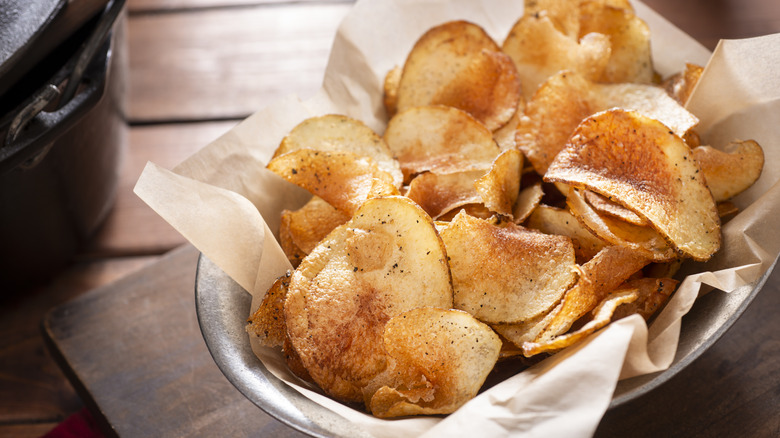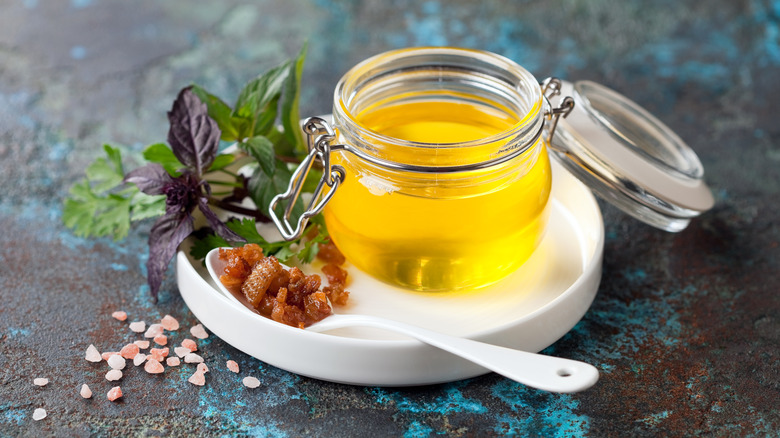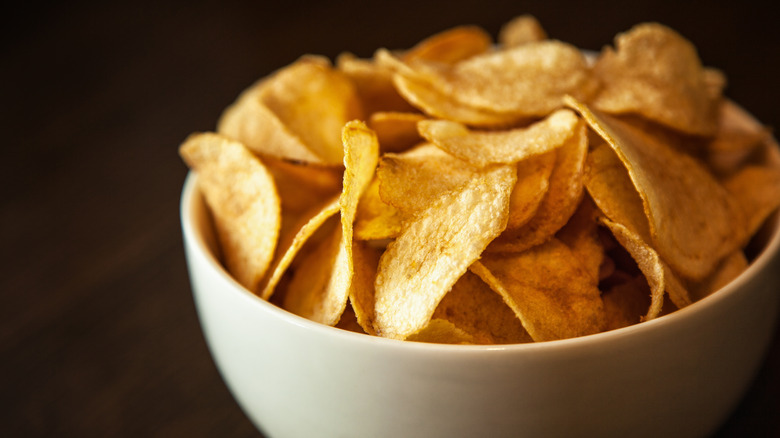The Most Delicious Fat To Fry Your Homemade Potato Chips In
It's easy enough to break open a bag of store-bought potato chips, and there isn't anything wrong with that. But, if you have the time and ingredients to make homemade potato chips (it doesn't take much of either), then it's worth it to get just the right crisp, thickness, and flavor. But, how you cook those potatoes does matter; potato chips can be deep fried, air fried, or even baked. If you're going with the traditional deep frying method, you should consider making the simple swap for duck fat to get the most flavor and a perfect crisp.
Duck fat might not be as common in household cooking as other oils or animal fats, but there's a reason it's so widely regarded by chefs. It adds a rich flavor to dishes that other animal fats don't, and it's surprisingly healthier, too. Duck fat is lower in saturated fat than both beef and pork fat, making it a solid alternative to the former two. Its fatty acid makeup resembles that of olive oil or avocados, both of which are regarded as healthy when used or consumed in moderation.
Use duck fat for homemade potato chips
Potato chips are usually fried in oil that's around 350 degrees Fahrenheit, which means any oils or fats with a lower smoke point than that should not be used. Duck fat's smoke point is 375 degrees Fahrenheit, making it a great option. It's used for its deep, umami flavor profile that complements the foods, unlike other, more neutral oils.
You can either render your own duck fat or purchase it from the store. If rendering it yourself, you'll likely either cook a Pekin or Mallard duck. The rendering process takes a little while; you'll have to dedicate about an hour. Prior to cooking the duck, remove the skin and fat from the meat; that fat then should be cooked down alongside some water until the water has fully evaporated out and the fat has completely released itself from the skin. From there, you can remove the fat and store it in an airtight container, where it will last for about six months. You can freeze it, too; it's good for one year in the freezer.
Other tips for duck fat potato chips
Using duck fat is no different than other types of animal fat or oils. Heat it in a large pot, preferably with an oil thermometer to ensure that it doesn't heat beyond its smoke point. Then, fry thinly sliced potatoes in batches — this will help them get crispy because they won't get over-crowded and the oil temperature won't drop much. Keep an eye on the potato chips to ensure that they don't burn; they shouldn't take more than 10 minutes to cook, but it could be less depending on their thickness.
No matter how you make your potato chips, they should always be salted. Sea salt pairs well with potatoes because of its bold flavor, and it lacks the metallic taste of iodized salt. Since potato chips are so thin, though, make sure the salt is finely ground to create better distribution. Otherwise, you could end up with overly salty chips. While you want the potato flavor to shine through here, you can also sprinkle them with a few other seasonings, such as paprika or black pepper.


